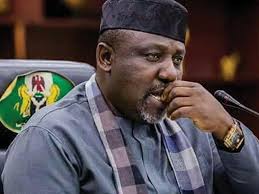An Abuja Federal High Court on Wednesday declined Senator Rochas Okorocha’s request for an order restraining the Economic and Financial Crimes Commission (EFCC) and the state probe panel from investigating him on alleged financial infractions.
Justice Ahmed Mohammed rejected the request after counsel to the former Imo State governor, Oba Maduabuchi, SAN, informed the court that since the defence counsel asked for an adjournment to respond to processes served on them, the court should make an order stopping the parties in the suit from going ahead with the probe, pending the determination of the matter.
Though counsel to the 1st defendant (EFCC) was not in court, the counsel to 2nd to 48th defendants, J.M. Madu, quickly interjected that the probe panel had not commenced sitting.
Promising to inform the Attorney-General of Imo about the development, Madu urged them to respect the court and not to begin sitting until the suit was determined.
Justice Mohammed then held that it would be of no use to grant a restraining order since Madu had undertaken to tell the parties not to go ahead with the probe pending when the matter would be determined.
Besides, the judge held that since the EFCC was not represented in court to hear its side of the story, it would be unfair to grant the request in the interest of justice.
In a suit marked FHC/ABJ/CS/558/2020 filed on May 28, Okorocha specifically wants the EFCC to end or suspend its investigation, including all the petitions submitted to it by the Imo government until the panel on contract set up by the same state government had concluded its probe on his government between 2011 and 2019.
Other defendants in the suit are the Attorney-General of Imo; members of the Judicial Commission on Lands and Related Matters, members of the panel to investigate the activities of ISOPADEC; members of the panel to investigate the status of the newly established tertiary institutions; members of the investigative committee for financial transactions in Imo State; Committee for the Review of appointments recruitments and related matters from 2015 till date and the committee for the investigation of council areas, among others.
Maduabuchi told the court that although the EFCC was duly served, it was not represent in court.
He said the matter was for the originating motion to be heard and that all the defendants had been served with all processes, including the originally motion.
He said: “I am prepared to move the motion. We have the motion (interlocutory injunction motion) dated May 28, restraining the respondents from probing or continue to probe the activities of Imo Government between 2011 and 2019.”
Madu, who represented 2nd to 48th defendants, said he was not ready, pointing out that his clients only briefed him on the matter the previous day.
Madu said: “Upon the review of the originating process and the plaintiff’s motion for injunction, we intend to file our responses to the said originating process and the motion.
“In view of this my lord, and in the interest of fair hearing, we will apply for a short date my lord to file our responses.”
Madu also hinted the court that he had another application pursuant to the directive of the Chief Judge of the Federal High Court, Justice John Tsoho, that all matters be transferred to where the cause of action aroused.
“In the review of the originating motion of the plaintiff, we are humbly applying that this matter be transfered to Owerri Division of this court where the subject matter or cause of action aroused,” he said.
Countering Madu’s position, Maduabuchi said the defendants cannot choose where the matter should be heard, adding: “This is because the basic law as it relates to venue is that a suit can be filed where any of the defendant is resident. The EFCC’s head office is here in Abuja.”
He argued that the same chief judge, who made the circular, which he had not sighted and who had the constitutional power of assigning cases, was the person that assigned the case to the court.


